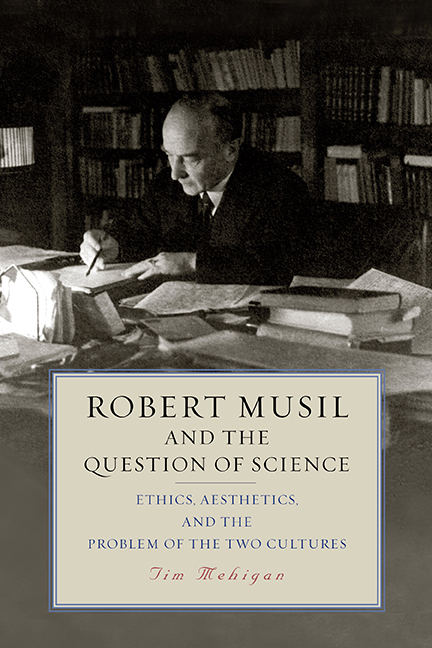Book contents
- Frontmatter
- Contents
- Preface
- Introduction: Musil’s Intellectual Position
- Part I Musil and the Two Cultures
- Part II Aesthetics and Ethics in the Context of the Two Cultures
- Conclusion: “A General Secretariat of Precision and Soul”: Ethics, Knowledge, and Literature after the Fourth Revolution 149
- References
- Index
7 - Unions: “An Episode of More than Merely Personal Significance”
Published online by Cambridge University Press: 26 April 2020
- Frontmatter
- Contents
- Preface
- Introduction: Musil’s Intellectual Position
- Part I Musil and the Two Cultures
- Part II Aesthetics and Ethics in the Context of the Two Cultures
- Conclusion: “A General Secretariat of Precision and Soul”: Ethics, Knowledge, and Literature after the Fourth Revolution 149
- References
- Index
Summary
THE YEARS FOLLOWING the release of Musil's first work, The Confusions of Young Törless, were of decisive significance for the budding writer. Towards the end of 1906 or in early 1907 Musil met his future wife, Martha Marcovaldi (1874–1949), six years his senior. In the following year he concluded his studies in philosophy and psychology at the Friedrich Wilhelm University in Berlin with a doctoral thesis on the physicist and philosopher Ernst Mach (discussed in detail in chapter 2). The thesis was given the grade of “laudable” and later was to bring about the offer of an assistant position with the noted professor of psychology in Graz, Alexius Meinong. This offer represented a chance to embark on a further academic project, qualify as a professor, and establish a university career. As attractive as this offer undoubtedly was to Musil, however, the unexpectedly auspicious debut of The Confusions of Young Törless had put him in mind of a literary career. This did not mean that he turned his back on the investigation of inner states that he had begun to address with such success in that first novel. He had no intention of abandoning this type of psychological project. Rather, he did not see the environment of the university, with its interest in articulating definitive general statements about the social behavior of human beings, as being conducive to the sort of project to which he was increasingly committed.
As Musil was later to remark in the foreword to his last published volume, Posthumous Papers of a Living Author, the project he was keen to develop further at this time involved the question of the relationship of individuals to their ideals (GW 7: 972). Clearly, any exclusively empirical approach to questions such as this would quickly hit upon limits. Musil's interest, by contrast, lay with the kind of complex value attributions and investments human actors make when the need to act presses upon them. These attributions could only hope to be partially elicited through external observation and conventional scientific inquiry. The academic approach to the question of human ideals seemed to Musil, for this reason, to fall short of the complex understanding of human motivation and behavior his project aimed for. Despite this, his intention was to embark on a credible intellectual path toward arguably the same results on which scientific analysis was premised.
- Type
- Chapter
- Information
- Robert Musil and the Question of ScienceEthics, Aesthetics, and the Problem of the Two Cultures, pp. 110 - 121Publisher: Boydell & BrewerPrint publication year: 2020



